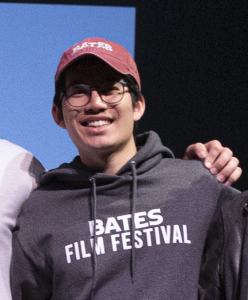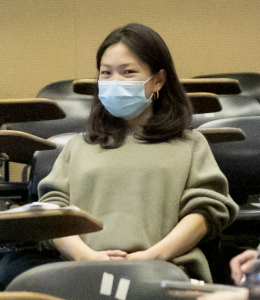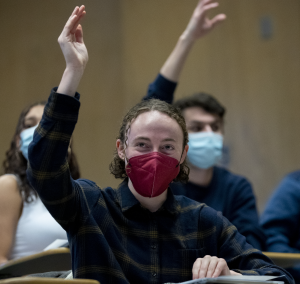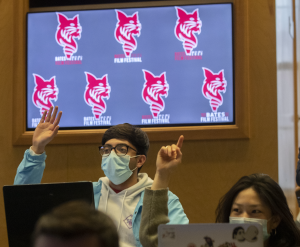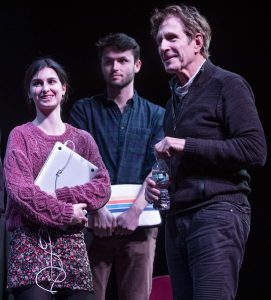By Eleanor Shields (BFF 2019, Bates Class of 2020)
As one of the four student participants in the Bates Film Festival “Short Term Innovative Pedagogy and Course (re)Design Program” (STIP), I received the unique opportunity to visit the International Film Festival – Boston (IFFB) in May 2019. Our group, consisting of myself (‘20), Abel Ramirez (‘20), Victoria Arjoon (‘19), and Professor Jonathan Cavallero, altogether viewed 13 feature-length films and approximately 20 short films. Though our IFFB attendance was initially conceived as a valuable film-scouting expedition, what I took away from my attendance at the IFFB far transcended solely film scouting.

As I had never before attended a film festival, this opportunity offered me crucial insight into the planning and organization required to run a festival. For example, some of the aspects critical to the overarching goals of film festivals, such as the privileging of independent films and the fostering of viewers’ engagement with the films, were not apparent to me until I witnessed its unique characteristics in action at the IFFB. These, albeit generalized, ultimate qualities found in film festivals were eloquently outlined by Marijke de Valck in the book Film Festivals: Theory, Method, Practice:
“Though our IFFB attendance was initially conceived as a valuable film-scouting expedition, what I took away from my attendance at the IFFB far transcended solely film scouting.”
“[Film festivals typically program] films without well-known actors, often dealing with serious themes, produced on small or medium budgets, and without the financial resources to compete with Hollywood’s marketing machine. At film festivals, these films are not simply screened and left to popular vote; they are embedded in a rich discursive context that encourages discussion, reflection, and engagement with the films’ content and aesthetics.” (106)
This excerpt highlights many of the quintessential qualities that I observed at the IFFB: that film festivals are about community, bringing together filmmakers and film viewers alike in celebration of independent films. Grasping an understanding of these values allowed me to conceptualize how our festival may take form on Bates’ campus, especially if we were to follow the programming theme of screening “social justice” oriented films like we did during the first Bates Film Festival in 2018. In fact, I realized that in many ways, the mission of the 2018 Bates Film Festival to “present work that serves as a platform for productive discussions that engage topical social and political issues” was nicely complemented by the work that many other film festivals such as the IFFB have been doing for years (2018 Bates Film Festival).
“Film festivals are about community, bringing together filmmakers and film viewers alike in celebration of independent films.”
With this new knowledge in mind, the Bates Film Festival (re)Design Team returned to Bates and began crafting the first draft of the festival’s 2019 mission statement and the 2019 rubric for evaluating films. First, we decided to maintain many of the aspects central to the festival’s 2018 mission statement. However, one of the changes we implemented altered the above quotation to the following: “together, we foster an appreciation for the artistry of screen media and present work that cultivates productive discussions of topical social and political issues” (2019 Bates Film Festival). Though this change may seem like only a minor syntax modification, this alteration much better aligned with our values to place festival directors, board members, and audience members on the same platform of appreciation and engagement with social and political issues, rather than elevating festival programmers to merely observational positions.
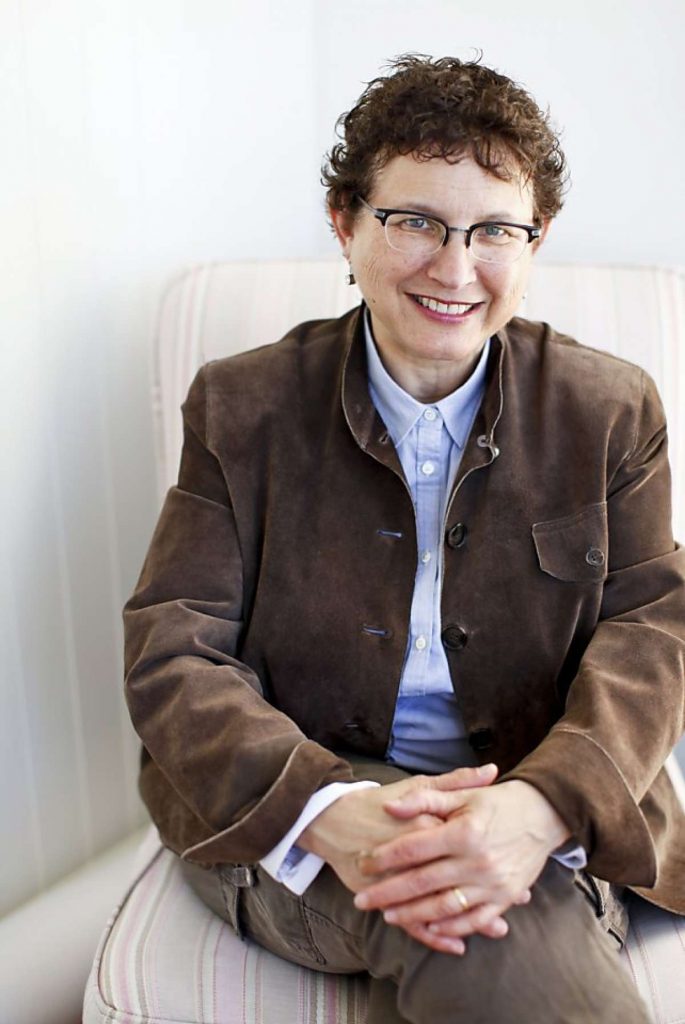
Second, the (re)Design team worked to develop a thorough rubric that engaged all of the aspects important to us when making film programming decisions. Our newly developed categories for consideration are as follows: point of view/international perspective, ethical representation, content/intentional aesthetics, emotional engagement, relevance to the festival’s mission statement, perceived relevance to the community, tie-in to the broader Bates curricula, and “overall impression.” When reading those categories altogether, it is evident that many of our primary concerns involved selecting films that brought up conversations to address important needs in our communities, locally and globally. As put by B. Ruby Rich in The Film Festival Reader, festivals often “spring up organically to fill political needs” (162). More specifically, Rich notes that festivals “can be sites for identity formation, for people to come to be in community, to feel a sense of belonging in an otherwise alienating culture, places where for at least for the length of a film or video program, or in the space of a lobby, the world can be a different place” (162). I am confident that the Bates Film Festival will continue to work towards these community standards in future iterations of the festival, though they may have been high goals to fully achieve so early in the festival’s legacy.
“Many of our primary concerns involved selecting films that brought up conversations to address important needs in our communities, locally and globally.”

In addition to the valuable experience of witnessing the overall social and political atmosphere at the IFFB, I also paid close attention and noted the many efforts in action at the IFFB that would possibly be required of myself and the other student programmers for the Bates Film Festival. This included efforts such as negotiating with distributors and co-sponsors, and communicating with community members, directors, producers, and actors, all while participating in media interviews, and writing program copy. Like a well-oiled machine, the IFFB effectively minimized the visibility of these efforts to the festival goers. As put by Liz Czach, concealing the “dirty-work” behind a festival is important because “like a well-edited film adhering to the rules of continuity editing, a film festival doesn’t explicitly foreground how it is put together—it doesn’t show its seams” (201). This would be a motivating factor for me throughout the rest of the 2019 Bates Film Festival’s planning, as I actively worked to smooth out wrinkles before the storm. For example, I frontloaded the designing and ordering of our new Step & Repeat banner so it was ready well in advance of the actual festival. I also created and shared a contact sheet containing all of the Bates Film Festival directors’ cell phone numbers in case we needed to reach each other in moments of crisis. Though recognition for our efforts is nice, it is also gratifying to realize that the “months of work involved [are] mostly forgotten in the exhilarating chaos of the festival itself” if the festival results as planned (Czach 201).
Overall, I am very thankful for the perspectives I gained while attending the International Film Festival Boston. For me, attending the IFFB was immensely valuable in my initial conceptualization of the possibilities of our festival at Bates. Ultimately, these realizations guided me throughout the planning, organization, and running of the 2019 Bates Film Festival.
Works Cited
Czach, Liz. “Affective Labor and the Work of Film Festival Programming.” In Film Festivals: History, Theory, Method, Practice. Edited by Marijke de Valck, Brendan Kredell, and Skadi Loist. 196-208. Routledge, 2016.
De Valck, Marijke. “Fostering Art, Adding Value, Cultivating Taste: Film Festivals as Sites of Cultural Legitimization.” In Film Festivals: History, Theory, Method, Practice. Edited by Marijke de Valck, Brendan Kredell, and Skadi Loist. 100-116. Routledge, 2016.
Rich, B. Ruby. “Why Do Film Festivals Matter? (2003-2004).” In The Film Festival Reader. Edited by Dina Iordinova. St. Andrews: St. Andrews Film Studies, 2013.


